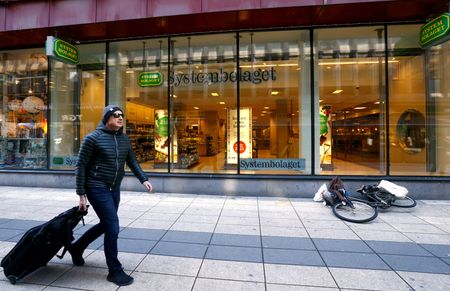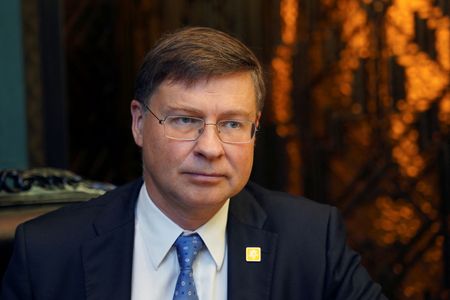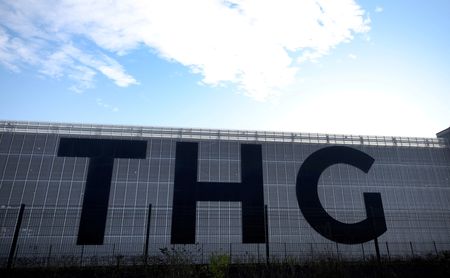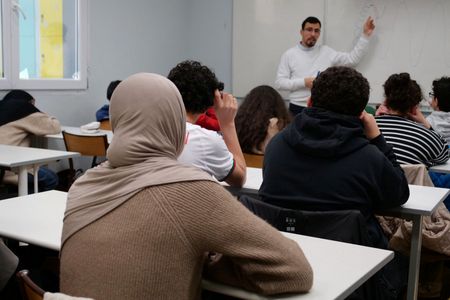By Elena Fabrichnaya and Gleb Bryanski
MOSCOW (Reuters) – Russian central bank chief Elvira Nabiullina is safe in her job for two more years with President Vladimir Putin’s personal support but the Kremlin will face a succession dilemma when her record tenure ends in 2027, two senior sources told Reuters.
Nabiullina, 61, has faced intense criticism from lawmakers and some prominent businessmen since she was appointed in 2013, but has always endured with Putin’s backing.
Rumours of her demise intensified after the bank hiked rates by 200 basis points to 21% in October in an attempt to counter the inflationary pressure of the biggest Russian military spending since the Cold War.
Critics openly accused her on state television of sabotaging the Russian economy to help the United States, or of driving businesses to the brink of bankruptcy with an overly orthodox obsession with battling inflation.
But Nabiullina will stay in her role until her term expires in 2027 – when, by law, she has to step down – according to two senior sources who spoke to Reuters on condition of anonymity due to the sensitivity of the situation.
The sources – one senior Russian official and one top-level figure in the financial sector, both familiar with internal Kremlin discussions – told Reuters that Nabiullina was safe provided that no major policy mistakes occurred.
“She is not at risk; she has a strong position,” said the Russian official. When asked if the Kremlin is considering a successor, the official simply noted that her contract has two years yet to run.
But some insiders are already talking about “Problem 2027”, by which they mean the challenge of replacing not only Nabiullina but members of her team who may be tempted by more lucrative jobs elsewhere once she is no longer around.
A senior job in Russia’s central bank, although prestigious, pays less than commercial banks and carries a higher risk of coming under Western sanctions – implying lost access to travel, foreign assets and education abroad for one’s children.
“There is no problem now, the problem lies in 2027 when half of the central bank will leave with her, and there is simply no alternative team,” said the senior financial source.
RARE PRAISE
The two keys to Nabiullina’s longevity are the confidence of Putin and her efficiency in preserving macroeconomic stability despite Russia’s conflict in Ukraine. When it started in 2022, she was lambasted simultaneously by nationalist hawks who questioned her loyalty to Putin and Kremlin critics who likened her to Adolf Hitler’s war production minister Albert Speer.
A source with knowledge of discussions at the central bank said that the West’s decision to freeze Russia’s foreign currency reserves over the conflict in Ukraine had strengthened Nabiullina’s resolve to continue working.
The Russian economy has performed better than expected for the past three years but is set to slow down sharply this year, stifled by high interest rates.
Additionally, Russia is preparing for a period of low oil prices and slumping budget revenues as high import tariffs imposed by U.S. President Donald Trump dampen global demand, making it a bad time for Putin to change horses, sources said.
“The tectonic changes in global trade are unfolding before our eyes, and it is still very difficult to judge where they will lead the global economy and how they will affect Russia,” Nabiullina herself told parliament this month.
In a sign that her position has strengthened in recent weeks, Nabiullina received rare praise from lawmakers during her annual report on April 9 for shielding the economy from Western sanctions and developing a national payments system.
“The leadership of the central bank, as well as the parliament’s banking committee, should be praised for doing everything in order to protect our country’s financial system,” influential Duma (parliament) speaker Vyacheslav Volodin said.
(Writing by Gleb Bryanski; editing by Mark Trevelyan and Mark Heinrich)










